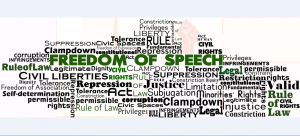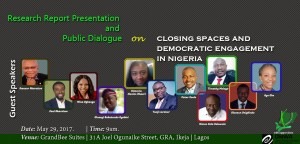SPACES FOR CHANGE is launching its research report today, Monday, May 29, 2017. The research study, “Closing Spaces for Civil Society and Democratic Engagement in Nigeria“, examined in great depth, the factors triggering the governmental restriction of the popular spaces used for charitable activities, civil society activism and democratic engagement in Nigeria. The restrictions, usually framed around the objective of protecting national interest and security, are often triggered by a number of international regulations and treaties that governments have either ratified or submitted to its implementation. An example is the 40 Recommendations handed down by Financial Action Task Force (FATF), the global body that sets the standards for combating money laundering (ML) and the financing of terrorism (FT).
Is there any evidence linking the implementation of FATF Standards in Nigeria with the multiplication of oversight regimes for regulating non-profit organisations, resulting in the growing restrictions to their operations? Beginning from November 2016, SPACES FOR CHANGE launched a systematic inquiry into Nigeria’s legal regimes for combating money laundering and financing of terrorism in order to understand the linkages between the country’s compliance with FATF’s Recommendations and the shrinking spaces for civic engagement and civil society operations in Nigeria.
We documented our findings in two parts: The first part, Beyond FATF: Trends, Risks and Restrictive Regulation of Non-Profit Organisations in Nigeria, examined the (in)adequacy of Nigeria’s legal framework for countering terrorism-financing and money laundering in order to determine whether a proper evidential link exists between the enforcement of FATF standards and the broadening state endeavours to close the spaces for civil society work in the country. The second part, Closing Spaces for Civic Engagement and Civil Society in Nigeria, generated a database of closing spaces in Nigeria, presenting the evidence of excessive restrictions on citizens and civil society operations, perpetrated under the guise of ‘national interest’, ‘national security’ and ‘other ML and FT’ considerations.
The report will be launched at a press briefing and public dialogue in Lagos, Nigeria. The report launch coincides with Nigeria’s Democracy Day, commemorated annually on May 29, in honor of the return to democratic rule in Nigeria on May 29, 1999. Ms. Ayo Obe (a pioneer civil society leader and activist) and Ikeazor Akaraiwe, (a legal luminary) are the book reviewers. An array of participants drawn from the civil society, the media, security agencies, anti-money laundering departments, the financial sector, the legal and human rights community will take part in the dialogue.
Speaking about the research report, SPACES FOR CHANGE’S Executive Director, Victoria Ibezim-Ohaeri elucidates that ‘the report looks at how state actors across Nigeria’s six geopolitical regions, comprising executive governors, security agencies, state and federal parliaments as well as government officials and departments, obstruct and constrain the spaces through which activists, media groups, non-governmental organisations, community associations, religious movements and other active citizens use to engage and demand accountability from the political leadership at various levels. Restrictive legislations like the rested Social Media Bill, the NGO Bill 2016, among others, also form part of efforts to clamp down the civic space in Nigeria in the name of national security and other considerations.’’
This research report presents the evidence and legal arguments needed to protect the integrity of NPOs in Nigeria and resist the clampdown on civil society. It further recognizes that debate and disagreement are fundamental ingredients of a healthy democracy. Today’s Democracy Day offers another opportunity to undertake a collective introspection into the state and quality of civic engagement and demand for the establishment of purely democratic norms and values in Nigeria. Open Society Initiative for West Africa (OSIWA) provided the funding for this research.
SIGNED
SPACES FOR CHANGE
MAY 29, 2017






















